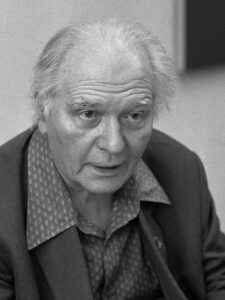Messaien, Quartet for the End of Time (V. Louange à l’Éternité de Jésus)
 French-born Olivier Messiaen (1908-1992) is one of the more eclectic composers of the 20th century. He incorporated serialism, complex rhythmic modes, Japanese and Indonesian influences, and birdsongs, but retained a strong sense of melody and recognizable form.
French-born Olivier Messiaen (1908-1992) is one of the more eclectic composers of the 20th century. He incorporated serialism, complex rhythmic modes, Japanese and Indonesian influences, and birdsongs, but retained a strong sense of melody and recognizable form.
Carol discussed his Quartet for the End of Time in one of her talks for the Classical Consortium last week, and so it seems like a good time to feature it here.
Messiaen enlisted as a medic in the French Army at the outset of World War II. He was captured and, while a prisoner at Stalag VIII-A in Görlitz, he met a clarinetist, violinist, and cellist who were able to access these instruments. Thus, he composed Quartet for the End of Time based on that instrumentation. The work was premiered for the prisoners and guards in January 1941 with Messiaen playing a battered piano in freezing temperatures.
The work interprets the passage from the Book of Revelation in which the angel announces the end of time. Rev 10:1–2, 5–7. The complete work includes eight movements and lasts approximately 50 minutes, although we are featuring only the fifth movement here. (I would encourage you to listen to the entire work.)
Some movements are scored for solo, duet, or trio. The third movement for example (“Abyss of the Birds”) is for solo clarinet. Already here we see a reflection of Messiaen’s fascination with the rhythms and pitches of bird songs. He traveled extensively and frequently transcribed birdsongs of different regions to incorporate in his music.
The highly introspective fifth movement featured here (“Praise to the Eternity of Jesus”) is scored for piano and cello. Of it Messiaen wrote:
Jesus is considered here as the Word. A broad phrase, “infinitely slow”, on the cello, magnifies with love and reverence the eternity of the Word, powerful and gentle, “whose time never runs out”. The melody stretches majestically into a kind of gentle, regal distance. “In the beginning was the Word, and Word was with God, and the Word was God.”
Messiaen was a devout Catholic who held the post of organist at Église de la Sainte-Trinité from 1931 until his death.



